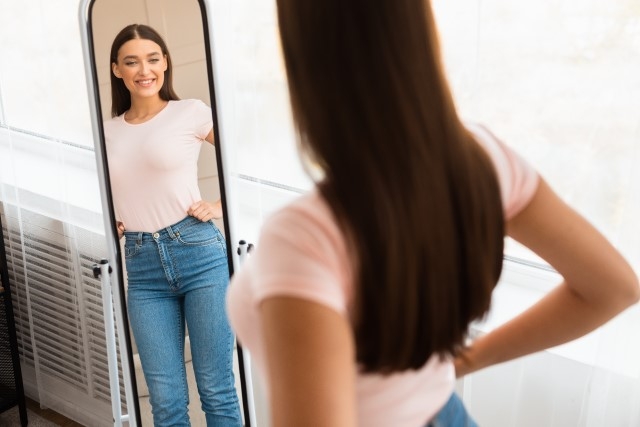
Our brain’s perception of our body is based on the importance of our sense of touch. TUCHONG
In English it’s common to say, “I know this town like the back of my hand!” While we may know our towns really well, how well do we actually know our hands? Maybe not quite as well as we think, said a scientific study.
在英语里,我们通常会说:“我对这座城镇了如指掌!”虽然我们可能非常了解自己所在的城镇,但又有多了解自己的手掌呢?一项科学研究指出,我们可能不像自己想象的那么了解。
Matthew Longo and his team from University College London studied the left hands of 100 people. With their hands placed palms down under a board, Longo’s team gave the instruction to point to their knuckles and fingertips with a marker. How did they do? Not that well.
来自伦敦大学学院的马修·隆戈及团队研究了100人的左手。该团队将人们的手掌放在一块板子下,然后让他们用记号笔指向自己指关节和指尖。大家指得怎么样?并不是那么准确。
“People think their hand is wider than it actually is,” said Longo. He said they also seemed to think their fingers were shorter than their true lengths. People were most accurate when finding their thumbs, but became less accurate with each finger, up to their pinkies.
隆戈说:“人们认为自己的手比实际要宽。他还说,大家似乎还认为自己的手指比实际长度短。人们在找大拇指时最准确,但越指向小拇指,准确率就越低。
“It is connected to our sense of position,” explained Longo. Humans know where different parts of our bodies are, even if we can’t see them. “It tells us whether a joint is straight or not,” said Longo. “We also need to know the distances between our joints,” he went on. Our brains know the sizes and shapes of our bodies from the maps they make for themselves. “This experiment tried to find those maps,” he said.
隆戈解释道:“这与我们的方位感有关。”人类知道自己身体不同部位的位置,即使我们看不见。“我们通过方向感得知关节是否伸直,”隆戈继续说道,“我们还需要知道关节之间的距离。”我们的大脑根据自己绘制的地图,来了解我们身体的大小和形状,他说:“这个实验试图找到那些地图。”
Maybe maps don’t need to be perfect. But why aren’t our brains more accurate? Longo said our brains “see” areas based on our sense of touch, with the stronger the sense of touch in a specific body part, the bigger that body part seems. An example is our lips. As they have more nerves than our noses, our brain’s map shows our lips are bigger. The same thing can happen with body parts that have a lot of nerves. If you’ve ever had something stuck in your teeth, it probably felt huge! That’s because our tongues also have lots of nerves.
也许这些地图不需要尽善尽美,但为什么我们的大脑不能更准确呢?隆戈说,大脑“看到”的区域是基于触觉,身体某个特定部位的触觉越强,这个部位看起来就越大。嘴唇就是一个例子,因为嘴唇比鼻子拥有更多神经,我们的大脑地图就显示嘴唇更大。其他长有很多神经的身体部位也会出现这种现象。如果曾经有东西卡在你的牙齿间,你可能会感觉这东西很大!这是因为我们的舌头也有很多神经。
If you want to have some fun, try this test with your classmates. Get some boards and some markers and have them mark the spots where they think their knuckles and fingertips are. Compare their hands to the marker spots and see how well they have performed.
如果你想找点乐子,可以和同学一起做这个测试。拿一些板子和记号笔,让他们在自认为是自己指关节和指尖的地方做记号。然后将他们的手与记号作比较,看看他们的表现如何。
查看更多关于【双语新闻】的文章










